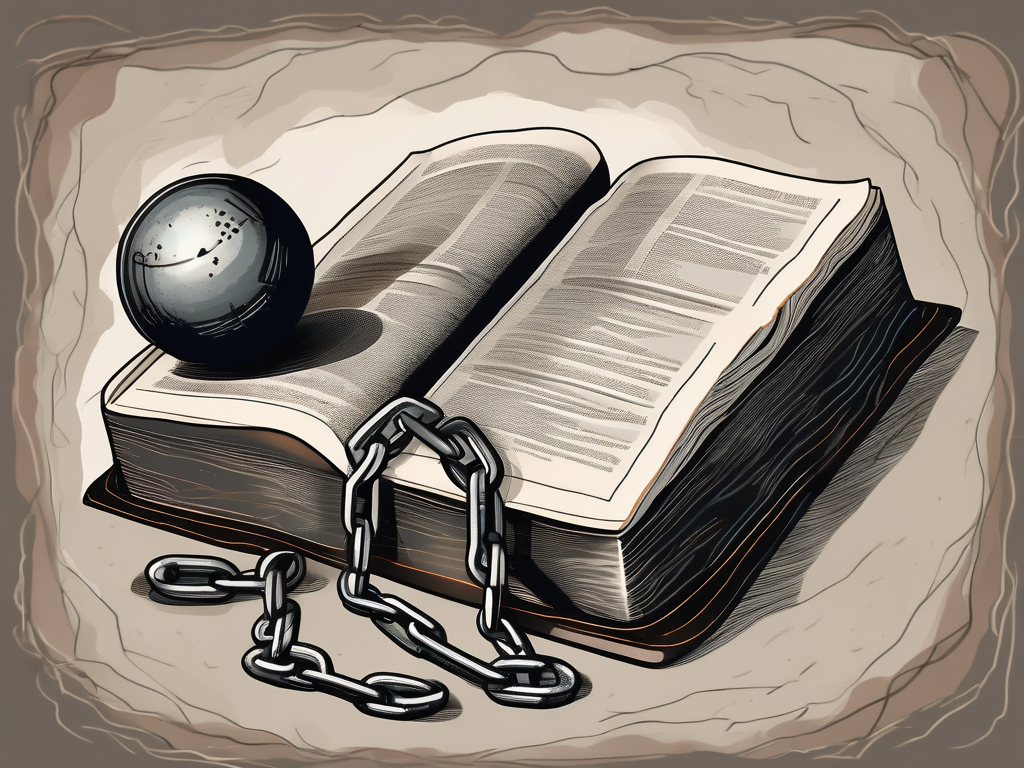Slavery is a complex and sensitive topic, and discussions surrounding it often delve into historical and moral considerations. It is important to approach this matter with an open mind and explore the various perspectives. In this article, we will examine what the Bible says about slavery and its implications in different contexts.
Understanding the Historical Context of Slavery in the Bible
Before we dive into the specific biblical passages, it is crucial to understand the historical context surrounding slavery in the ancient world. In many ancient societies, including those mentioned in the Bible, slavery was a prevalent institution. Slavery existed for various reasons, such as economic exploitation, military conquests, and debt repayment.
In ancient Mesopotamia, one of the earliest civilizations, slavery was an integral part of the social structure. Slaves were often captured during wars or born into slavery. They performed various tasks, including agricultural work, domestic chores, and serving as concubines or eunuchs in the royal courts.
Ancient Egypt, another significant civilization, relied heavily on slave labor. Slaves were acquired through military campaigns, trade, or as a result of debt bondage. They worked in various sectors, including agriculture, construction, and mining. Slavery was so deeply ingrained in Egyptian society that even high-ranking officials and nobles owned slaves.
The Role of Slavery in Ancient Societies
Slavery played a significant role in ancient societies, with slaves being considered as property rather than individuals with inherent rights. They could be bought, sold, inherited, and even used as collateral for loans. Slaves had no legal status and were subject to the will of their owners.
In Greece, slavery was a fundamental part of the economy and social structure. Slaves were acquired through warfare, piracy, or as a result of debt. They performed various tasks, including household chores, agricultural work, and even skilled labor. Some slaves were educated and served as tutors or personal assistants to their owners.
In the Roman Empire, slavery was widespread and diverse. Slaves were acquired through conquests, trade, or as a result of debt. They worked in various sectors, including agriculture, mining, construction, and even as gladiators. Slavery in Rome was so pervasive that it is estimated that at its peak, around one-third of the population consisted of slaves.
The Biblical Era and Slavery
Within the biblical era, slavery was deeply ingrained in the social fabric of the time. It is important to note that the Bible does not explicitly condemn or endorse slavery as an institution. Instead, it provides guidelines regarding the treatment of slaves and interactions between slaves and their masters.
In the Old Testament, slavery is mentioned in various passages, including regulations on the treatment of Hebrew slaves and foreign slaves. The laws provided some protections for slaves, such as the requirement to release Hebrew slaves after six years of service and the prohibition of returning escaped slaves to their masters.
In the New Testament, the Apostle Paul addresses the issue of slavery in his letters. He encourages slaves to obey their masters and masters to treat their slaves with kindness and fairness. However, Paul also emphasizes the equality of all believers in Christ, stating that in Christ, there is no distinction between slave and free.
It is important to approach the biblical passages on slavery with an understanding of the historical context and the gradual development of ethical principles. While the Bible does not explicitly condemn slavery, it provides a foundation for the eventual abolition of slavery by emphasizing the dignity and equality of all individuals.
Biblical Passages Addressing Slavery
Let us now explore some of the specific passages related to slavery found in the Bible.
Slavery, a complex and controversial topic, is addressed in various passages throughout the Bible. These passages provide insight into the historical context and the treatment of slaves during biblical times.
Old Testament References to Slavery
In the Old Testament, we encounter various instances where slavery is mentioned. The ancient Hebrew society had laws and regulations regarding the treatment of slaves, both Hebrew and foreign. These regulations aimed to ensure fair treatment and protect the rights of slaves.
For example, the book of Exodus contains laws that govern the treatment of Hebrew slaves. According to these laws, Hebrew slaves were to be treated with fairness and kindness. They were to be released after six years of service, and their owners were obligated to provide for their well-being upon their release.
Similarly, the Old Testament also addresses the treatment of foreign slaves. The book of Leviticus emphasizes the importance of treating foreign slaves justly and with compassion. It outlines guidelines for their treatment, ensuring that they are not mistreated or oppressed.
New Testament References to Slavery
In the New Testament, slavery is also addressed, particularly in the letters of the Apostle Paul. Paul, writing to various early Christian communities, offers instructions to both slaves and masters, providing guidance on how they should interact with one another.
Paul’s letters emphasize the importance of mutual respect and fair treatment. While these passages do not explicitly challenge the existence of slavery, they encourage a compassionate and just treatment of slaves. Paul urges slaves to serve their masters faithfully, not out of fear but out of a sincere desire to honor God. He also instructs masters to treat their slaves with kindness and fairness, recognizing that they too have a Master in heaven.
It is important to note that these passages reflect the social and cultural context of the time in which they were written. Slavery was a common practice in the ancient world, and the Bible addresses it within that framework. However, these passages also lay the foundation for principles of equality and human dignity that would later shape the Christian understanding of social justice.
As we examine these biblical passages addressing slavery, it is crucial to approach them with sensitivity and a deep understanding of their historical context. They provide valuable insights into the treatment of slaves during biblical times and offer guidance on how to navigate complex social issues with compassion and fairness.
Interpretations of Biblical Texts on Slavery
Over the centuries, various interpretations of the biblical texts on slavery have emerged. Some take these passages literally, understanding them as supporting the institution of slavery. Others view these passages metaphorically, seeing them as guidance for contemporary relationships rather than an endorsement of slavery as an institution.
When examining the literal interpretations of biblical texts on slavery, it is important to consider the historical and cultural context in which these passages were written. Those who adopt a literal interpretation argue that the Bible’s acceptance of slavery demonstrates its divine authorization. They often caution against imposing modern ethical standards on ancient practices without considering the cultural context.
However, critics of the literal interpretation argue that while the Bible may acknowledge the existence of slavery, it does not necessarily endorse or condone it. They argue that the Bible’s teachings on love, justice, and equality are incompatible with the institution of slavery. These critics suggest that the Bible’s references to slavery should be understood metaphorically, as a means to convey deeper spiritual truths.
On the other hand, proponents of metaphorical interpretations believe that the Bible’s teachings encourage principles of love, kindness, and justice, which they see as incompatible with the institution of slavery. They suggest that the Bible uses slavery as a metaphor for our relationship with God or for other forms of oppression and bondage.
For example, some scholars argue that the story of the Israelites’ liberation from slavery in Egypt serves as a metaphor for humanity’s liberation from sin and spiritual bondage. They interpret the biblical texts on slavery as a call to fight against all forms of oppression and to seek justice and equality for all people.
Others interpret passages such as the Apostle Paul’s instructions to slaves and masters in the New Testament as a reflection of the social realities of the time rather than an endorsement of slavery. They argue that Paul’s teachings were intended to guide Christians on how to navigate their roles within a society that accepted slavery, while also promoting values of love, respect, and fair treatment.
It is important to note that interpretations of biblical texts on slavery can vary widely among different religious traditions and individual scholars. The ongoing debates and discussions surrounding these interpretations reflect the complex and nuanced nature of biblical scholarship.
In conclusion, the interpretations of biblical texts on slavery are diverse and multifaceted. While some take these passages literally and argue for the divine authorization of slavery, others view them metaphorically, emphasizing the principles of love, justice, and liberation. The ongoing dialogue and exploration of these interpretations contribute to a deeper understanding of the complex relationship between biblical texts and the institution of slavery.
Slavery and the Christian Church
The Christian Church has a complex and multifaceted relationship with slavery throughout its long and storied history. Let us delve deeper into the perspectives held by both early and modern church authorities, shedding light on the nuances and evolution of their views.
Early Church Views on Slavery
In the early days of Christianity, the church grappled with the issue of slavery, with varying opinions among its authorities. Some prominent figures, such as St. Augustine, justified slavery as a consequence of sin, viewing it as a necessary evil in a fallen world. Augustine argued that slavery was a result of humanity’s sinful nature and that it served as a form of punishment for wrongdoing. However, it is important to note that Augustine also emphasized the importance of treating slaves with kindness and compassion, advocating for their fair treatment within the bounds of the existing social structure.
On the other hand, there were voices within the early church that vehemently condemned slavery. St. Gregory of Nyssa, for instance, spoke out against the institution and called for the liberation of slaves. Gregory believed that all human beings were created in the image of God and therefore should be treated with equal dignity and respect. He saw slavery as a violation of this fundamental principle and advocated for its abolition.
As time went on, the church’s stance on slavery continued to evolve, reflecting both societal changes and theological reevaluations. The early church’s ambivalence towards slavery gradually gave way to a more unified condemnation of the practice, influenced by the growing influence of Christian teachings on human dignity and equality.
Modern Church Perspectives on Slavery
In modern times, the overwhelming majority of Christian denominations denounce slavery as an abhorrent and morally indefensible practice. Churches around the world advocate for human dignity, equality, and social justice, rejecting any interpretation of the Bible that would endorse or justify the institution of slavery.
Christianity’s condemnation of slavery is rooted in the belief that all human beings are created in the image of God, imbued with inherent worth and deserving of freedom. This conviction has led to the active involvement of churches in the fight against modern forms of slavery, such as human trafficking and forced labor. Christian organizations and individuals work tirelessly to rescue victims, raise awareness, and advocate for legislative measures to combat these grave injustices.
Furthermore, many Christian denominations have issued formal apologies for their historical complicity in the slave trade and the mistreatment of enslaved people. These apologies acknowledge the church’s past failures and express a commitment to learn from history and strive for a more just and equitable society.
It is important to note that while the majority of Christian denominations unequivocally condemn slavery, there may still be theological debates and differences of opinion on other social issues within the church. However, the collective voice of the Christian community today resoundingly rejects the notion that any form of slavery can be justified or tolerated.
As the Christian Church continues to grapple with the complexities of its past and present, it remains committed to promoting the values of justice, compassion, and human dignity. The ongoing dialogue and introspection within the church serve as a reminder of the importance of confronting historical injustices and striving for a more inclusive and equitable future.
The Bible, Slavery, and Modern Ethics
Considering the Bible’s teachings on slavery in light of modern ethics raises important questions about the relationship between biblical ethics and human rights.
Biblical Ethics and Human Rights
Modern ethical standards emphasize the inherent worth and dignity of every human being. Some argue that certain biblical passages, when understood through this lens, challenge the compatibility of slavery with God’s vision for humanity.
Reconciling Biblical Texts with Modern Views on Slavery
Many theologians and scholars engage in ongoing dialogue to reconcile the biblical texts on slavery with modern views on human rights. They seek to navigate the tension between the historical context of slavery and the universal principles of justice and equality emphasized by the scriptures.
In conclusion, when exploring the biblical perspective on slavery, we must be mindful of the historical and cultural context in which it was addressed. The Bible does not explicitly endorse or condemn slavery as an institution but provides guidelines for just and fair treatment within existing societal structures. Today, as we reflect on these ancient teachings, it is essential to consider modern ethical standards and advocate for equality and justice for all individuals, regardless of their social status.












